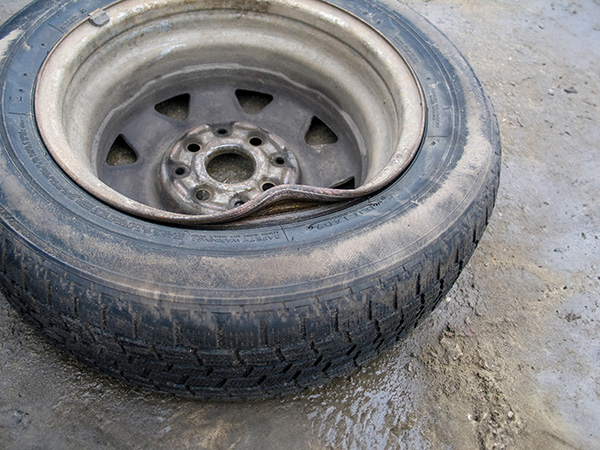
Potholes can sneak up on you, and even a small one can cause more damage than you might expect. One of the most common issues after hitting a pothole is a bent wheel rim. While it might not be immediately obvious, driving with a bent rim can lead to vibrations, uneven tire wear, and, in some cases, damage to other suspension components. Recognizing the signs of rim damage can help you identify the issue early and keep your vehicle safe on the road.
Why Potholes Cause Rim Damage
Your wheels are designed to handle the weight of your vehicle and normal road conditions, but potholes introduce sudden, intense impacts. When your tire strikes a sharp edge or deep hole, the force can deform the rim, creating bends or cracks.
Aluminum rims, which are common on modern vehicles, are particularly vulnerable because they’re lighter and less flexible than steel rims. While they offer better performance and aesthetics, they can bend more easily when hit hard.
Signs of a Bent Wheel Rim
Sometimes rim damage is obvious, but other times it hides beneath the surface. Watch for these common signs after hitting a pothole:
Vibrations While Driving
If you feel unusual vibrations in the steering wheel or through the seat, it could indicate a bent rim. These vibrations often worsen as you accelerate and can be mistaken for tire balance issues.
Uneven Tire Wear
A bent rim can affect how your tire contacts the road, causing certain areas of the tread to wear faster than others. If you notice premature or uneven wear, a rim inspection is a good idea.
Difficulty Maintaining Tire Pressure
If your tire keeps losing air after hitting a pothole, the rim may no longer form a proper seal with the tire bead. Slow leaks can cause frequent refills and reduced fuel efficiency.
Visible Dents or Warping
Sometimes the damage is visible. Inspect your wheels for dents, flat spots, or distortions along the edges. Even small bends can affect performance and safety if left unchecked.
Risks of Driving With a Bent Rim
Continuing to drive with a bent rim doesn’t just create vibrations; it can lead to more significant issues over time. A deformed rim can compromise tire integrity, increasing the chance of blowouts. It can also place added stress on suspension components like control arms and tie rods, which accelerates wear and reduces handling precision.
Poor tire contact caused by a bent rim makes stopping distances longer and steering less responsive, especially in wet or slippery conditions.
How Our Technicians Diagnose Rim Problems
If you suspect a bent rim, a professional inspection ensures you get accurate answers. Our technicians check for visible deformities, measure wheel runout, and test tire balance. In some cases, we remove the wheel entirely to inspect the inner surface, where hidden bends often occur.
We also check for related issues, like damaged tires or suspension components, which are common after hitting deep potholes. Addressing all potential problems at once helps prevent recurring issues and ensures your vehicle remains safe and smooth to drive.
Repairing vs. Replacing a Bent Rim
Not every bent rim needs to be replaced. Minor bends can often be repaired using specialized equipment that reshapes the wheel back to factory specifications. However, if the rim has cracks or severe warping, replacement is the safest option.
Driving on a compromised rim risks sudden tire failure, so our technicians always recommend the solution that prioritizes safety while keeping costs reasonable.
Protecting Your Wheels From Future Damage
While potholes are often unavoidable, there are steps you can take to minimize damage:
- Maintain proper tire pressure to absorb impacts more effectively
- Slow down when approaching rough roads or construction zones
- Avoid driving through puddles where potholes might be hidden
- Schedule regular tire and wheel inspections to catch small issues early
By staying proactive, you can reduce the likelihood of long-term wheel and suspension problems.
Get Expert Wheel and Tire Care at Woodie’s Auto Service & Repair Centers
At Woodie’s Auto Service & Repair Centers, with 19 locations across North Carolina and South Carolina, our technicians specialize in diagnosing and repairing bent rims, damaged tires, and other issues caused by potholes. Whether your wheel needs repair, replacement, or balancing, we make sure your vehicle drives smoothly and safely.
No matter where you are in the Carolinas, expert auto care is always close by. With convenient locations in North Carolina and South Carolina, our team is ready to keep your vehicle in top shape. Visit the location nearest you today and experience professional service you can trust.
North Carolina (NC)
- Charlotte, NC
- Davidson, NC
- Huntersville, NC
- Mint Hill, NC
- Matthews, NC
South Carolina (SC)
- Indian Land, SC
- Fort Mill, SC
- Summerville, SC
- Charleston, SC
- Rock Hill, SC
- Mount Pleasant, SC